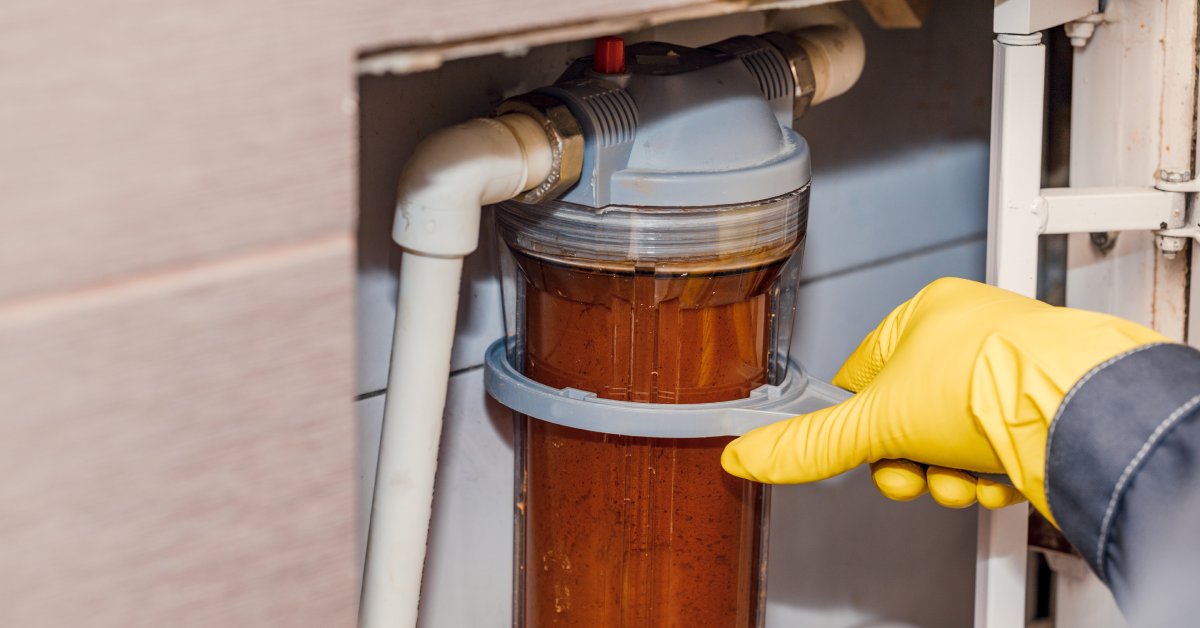29th Jan 2025
What Is a Sediment Filter & How Does It Work?
When it comes to ensuring a reliable supply of clean water, sediment filters are invaluable. Due to their importance to a wide range of applications, understanding the purpose and functionality of these essential filtration devices is key. No matter where you are, you deserve clean water, and high-quality filters play a major role in making that happen.
Sediment filters are often installed ahead of other filtration systems like carbon, reverse osmosis, or UV units, acting as the first line of defense. In addition to improving water quality, these filters protect downstream equipment, reducing wear and maintenance needs.
Today, we will explore what a sediment filter is, how it works, and how to choose and maintain the right filter for your needs. Use this guide to ensure you oversee a plumbing system that delivers clean, safe water to all building occupants.
Understanding the Importance of Water Filtration
The need for water filtration is not something you should ignore, especially if you are someone who works on plumbing in a building. This concern is particularly critical in areas where water quality is compromised by particulate matter. Real-world examples include well water with high silt content, municipal infrastructure with aging pipes, or industrial supply lines exposed to sediment buildup.
Sediment such as dirt, sand, silt, and debris can not only impact water clarity but also damage pipes, appliances, and pumping systems. Effective water filtration ensures the removal of these particles, preserving equipment lifespan and delivering water that meets both health and industry standards.
Neglecting filtration can lead to costly repairs, downtime, and increased maintenance requirements, emphasizing the value of preventative maintenance and long-term cost savings. Incorporating sediment filters into water systems ensures that professionals can safeguard plumbing installations and appliances from costly repairs and downtime.
How Sediment Filters Work
Sediment filters utilize a mechanical process to trap unwanted particulates from the water supply. Water flows through the filter media, which acts as a barrier that captures particles based on size. This process is further enhanced using different types of sediment filters, each designed to handle specific applications and levels of filtration.
Filter effectiveness is often measured by micron ratings, which indicate the size of particles the filter can capture. For example, a 20-micron filter removes larger debris, while a 5-micron filter captures much finer particles. Proper flow rate is critical: water moving too quickly can bypass the filter, while a slow flow may reduce system efficiency.
For instance, pleated filters provide high filtration efficiency for fine particles, while mesh filters are perfectly suited for larger debris that is in your pipes. When in doubt, check the manufacturer’s recommendations for particulate size to ensure you’re grabbing the right filter for the job.
The Many Types of Filters
Another factor to consider is the material used within the filter. Common materials include polypropylene, cellulose, and polyester. Polypropylene specifically is highly durable, polyester resists bacterial growth, and cellulose offers cost-effective filtration for less demanding applications.
Each material offers its own set of benefits, such as enhanced durability. Selecting a filter that aligns with the water source and application means users can achieve optimal filtration performance. For example, polyester filters are less susceptible to bacterial growth than cellulose alternatives.
Simply put, sediment filters come in many forms, and each is helpful in the right environment. Assess your plumbing system carefully to determine which filter will meet your needs successfully. Another key detail to know when learning what a sediment filter is and how it works is what key advantages these materials bring to the table.

Benefits of Using Sediment Filters
The use of sediment filters brings a host of advantages to both residential and commercial water systems. First and foremost, they significantly improve water quality by removing visible contaminants and ensuring a clear, clean supply.
This promotes both aesthetic and functional benefits, making water more suitable for drinking, bathing, and industrial processes.
Overall key benefits of using sediment filters include:
- Improved water clarity: removes dirt, sand, and silt for safer, cleaner water.
- Equipment protection: reduces wear on pumps, boilers, and PVC pipes and PVC filters
- Cost savings: prevents expensive repairs and extends equipment lifespan.
- Versatility: suitable for residential, commercial, and industrial applications.
These advantages contribute to long-term system performance and reliability across diverse water systems.
Impacting Appliance Quality & Personal Health
Another vital aspect is their ability to protect household and industrial appliances. Sediment buildup in appliances like washing machines, dishwashers, and water heaters can lead to reduced efficiency and premature wear.
Installing a sediment filter is a simple step that ensures these appliances are successfully shielded from harmful debris, resulting in better performance and extended lifespans.
From a health perspective, sediment filters reduce exposure to harmful microorganisms or particles that may negatively impact well-being. While these filters are specifically designed to capture solids and particulates, their role complements other filtration systems, ensuring a comprehensive water purification approach.
Selecting the Right Sediment Filter
Choosing the right sediment filter requires careful consideration if you want to avoid making simple mistakes that hinder your system’s overall filtration abilities. Common selection mistakes include choosing the wrong micron rating, neglecting flow rate considerations, or not distinguishing between disposable and reusable filters. The first step is to analyze the specific water source and determine the type and size of particles present.
Sources such as well water, municipal supplies, or rainwater harvesting systems each come with unique filtration needs. Thankfully, you can find versatile filters that work across various applications, making the search for the right fit quite easy. For instance, at Maxx Supply, you can find a mesh water filter that works in many settings, from residential well water systems to livestock feeding systems.
Particle Size & Proper Installation
Selecting a filter with the correct micron rating ensures that it effectively targets the intended particles. For instance, a filter with a micron rating of five can capture finer particles compared to one with a 20-micron rating. Understanding flow rate requirements for your application is equally essential since an undersized filter can restrict water pressure. Also, knowing whether a filter is disposable or washable helps avoid unexpected replacement costs and maintenance issues
Finally, proper installation must be considered to ensure the filter functions correctly. Placement, fittings compatibility, and flow direction must align with the overall plumbing design. Partnering with a professional installer minimizes the risk of errors and ensures reliable performance.

Maintenance of Sediment Filters
To keep sediment filters functioning at their best, regular maintenance is essential. Cleaning or replacing filters on a routine basis prevents clogging and ensures consistent water flow. Always check the manufacturer’s recommendations for ideal cleaning intervals, as these guidelines provide a useful benchmark for optimal upkeep.
Watch out for signs that may indicate your filter requires maintenance. Reduced water pressure, discoloration, or visible buildup on the filter’s surface are clear indicators that it’s time for cleaning or replacement. Acting promptly ensures you can avoid compromising water quality and equipment performance any further.
Sediment filter maintenance checklist:
- Inspect the filter monthly for buildup
- Clean or replace the filter according to the manufacturer’s instructions
- Check flow rate and pressure
- Verify fittings and seals remain secure
Washable filters can be reused after cleaning, whereas disposable filters must be replaced to maintain system efficiency. Neglecting this can lead to reduced water quality and potential damage to appliances or PVC pipes.
Ensuring Long-Term Water Filtration Success
After installation, a water filter sits out of your sight. This makes it easy to overlook maintenance. However, if you stay on top of filter upkeep, it will keep unwanted sediment out of your pipes.
Investing in sediment filters is a proactive step toward achieving clean and dependable water
systems, whether for residential or industrial applications. By understanding their importance, selecting the appropriate options, and maintaining them effectively, plumbers and maintenance companies can optimize filtration systems and minimize water-related complications.
For professional advice or assistance in choosing and installing sediment filters, consulting a trusted supplier or water treatment expert is highly recommended. Their expertise ensures that systems are carefully tailored to specific requirements, maximizing both efficiency and longevity. Sediment filters are an essential solution to maintaining clean, efficient, and durable water systems. Contact a trusted water treatment supplier to explore your options and find the right sediment filter for your needs.

